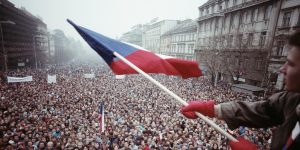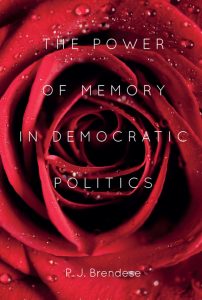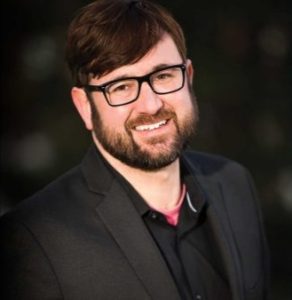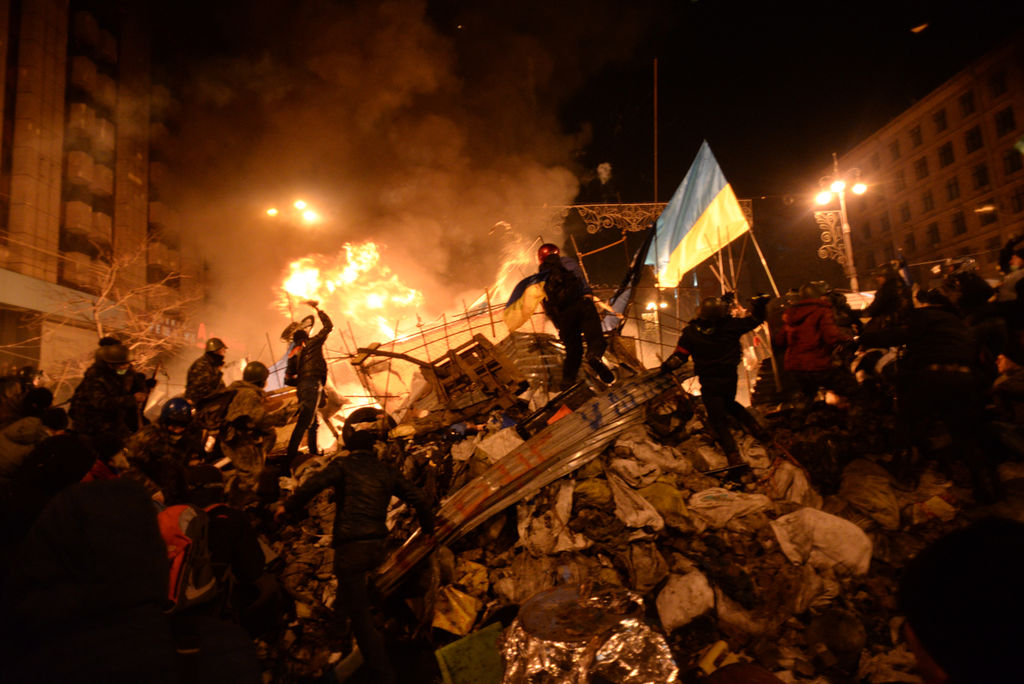Memory Ideology and Historical Identity
Kaaren Qasemi Dialectic with P.J. Brendese
Kaaren Qasemi had a dialectic with P.J. Brendese، Associate Professor of Political science at John Hopkins University, about historical memory in democratic policies.
What’s your definition of social justice?
First, your question seems to assume that I, or any one person, can (or should) define social justice. Yet if justice is social, shouldn’t the others with whom I share the world have a say too? I do not mean to sound dismissive in the least. It’s just that my project is not to define terms in a political world where definitions are socially constituted. For instance, if you think justice is fairness, then that invites questions about whose conception of fairness should justice depend?
One quickly asks what fairness actually is and for whom. Who has the power and prerogative to define those terms? The social contract theorists of the Anglo-liberal tradition are often credited by departing from the ancient notion that “might makes right.” I find plenty to disagree with in that account of the history of political thought, not least is that they generally grounded their philosophies in imaginary places like the State of Nature so as to imagine what humans would be like without government. And then they worked forward from there by following their various assumptions about human nature.

A young man holds Czechoslovak flag at the Wenceslas Square where gathered thousands of people in November 1989. Photo: David Turnley/CORBIS
More recently, heirs to this tradition such as John Rawls theorized justice by way of a thought experiment that asked readers to consider: if you didn’t know how you were going to show up on this earth, if you didn’t know how weak or strong you’d be physically, what family you are going to be born into, your class, sex or gender, who your parents are going to be, where you are going to be born, and so on, what would you consent to as constituting a just and fair social order? Ultimately what justice would look like is akin to your parents telling you and your sibling that one of you gets to cut a cake but the other gets to choose the piece. The idea is that if you don’t know which piece you are going to get, and you are the person cutting the cake, it is in your interest to try to cut it fairly. That’s an over-simplified rendition, of course, but plenty of critics have openly questioned the usefulness of ideal theory in a non-ideal world where pernicious legacies of racial hierarchy persist. So, I do not traffic in ideal theory. If I am a person of color how useful is it to me to contemplate a world without racial difference when the question of how my particular difference is treated is a matter of life and death?
Right now, what passes for justice in modern liberal societies today is deeply problematic-especially when it comes to historically entrenched legacies of inequality like white supremacy and hetero-patriarchy. Whether procedural, distributive, or rights-based, justice is largely oriented toward present-centered notions of reciprocity where you scratch my back, I scratch yours in the here and now. The problem with that, as I see it, is that there’s virtually no conception (or very little room) to think about what we owe to past ancestors or to generations to come. In liberal political theory the individual is the unit of analysis. This leaves too little space for things like collective debt obligation. If it’s just about you and me and who gets what piece of the cake right now; then why should I not pollute, for example, because the people that come after me cannot pay me back? What about reparations for slavery and the colonial dispossession of Native lands? Problems with liberal justice are why one hears Indigenous people saying “We don’t want a bigger piece of the pie. We want a different pie.”
Our contemporary conceptions of justice don’t make sufficient room for reckoning with ghosts that are very much present in enduring injustices. For instance, do we want to say that everybody is equally responsible for climate change? How do we want to deal with climate debt, taking account of the fact that the people who benefit the most from colonialism, the industrial revolution, and who live in the so-called “developed world” are far better off relative to those who live in low-lying conditions that scholars call the global south? Indigenous and Afrodiasporic communities who have historically polluted the least bear a radically unequal burden of climate change now.
Rethinking justice requires a time-sensitive, transgenerational perspective. One cannot simply say that because we are human, we are all equally embedded in the crises of the current era called the Anthropocene. Recalling the fact that not everybody has been considered equally part of the human race throughout time very quickly brings us into a conversation about race, debt, and how that figure into your original question about definition of justice. Of course, that’s just a start–and a modest one to say the least. It’s not an end. Hardly. At any rate, I explore these themes at greater length in my books The Power of Memory in Democratic Politics (2014) and Segregated Time (2022).
How did you become interested in political theory?
I was always interested in philosophy and I was also interested in politics. My family owns a funeral home, so I grew up with a morgue in my basement. At night I would be routinely woken up by my father to help move bodies of the deceased, so working with the bereaved was a large part of my childhood. I also helped facilitate rituals of mourning, burying the dead, and the transitions people go through when they are experiencing great loss. So my philosophical questions are rooted in that background, where I was often dealing with adults who didn’t know how to grapple with those situations because, as you know, life doesn’t come with a handbook that says “This is how you cope when loved ones are ripped from you.” But we all die. And, despite all our notions of progress, we all inhabit these relatively fragile Endo skeletal bodies that deteriorate with age. As a child, I saw countless adults (who were supposed to know everything) wrestling with situations where what they thought they knew about life didn’t work for them anymore. That was extremely powerful. Our existential condition as mortal beings means that contemplating questions about the presence of the past is important work. It quite literally gets us where we live.
A bit of context. I am from the United States, where we tend to disappear our dead, our infirmed, and our old people. So not only do we disappear the dead, we also disappear the dying. That so much energy is expended in fetishizing youth and the disavowal of death has always seemed a bit strange to me. Over time, I saw that disappearance in my academic studies when I started to turn to Anglo-European political theory, in which there was a disavowal of death and the issues of presentism and racial amnesia I mentioned earlier. Those resonated with my own political philosophical questions.

The Power of Memory in Democratic Politics book by P. J. Brendese
Philosophically I was asking: what kind of relationship to the past would lend itself to a flourishing of future possibilities, given that (for better or worse) we are creatures endowed with memory? If we are haunted by the past, how are we to live as free beings when that past might irrupt unbidden, at any given time? As creatures of memory, what does it mean to be free?
Those are philosophical questions, but they are also political–especially because liberal freedom is frequently construed in terms of freedom from the past. The way I interpolated them politically found me asking: what relationship to memory does democracy require? Throughout the history of democratic transitions from ancient Greece through contemporary times, there has been a lot
of willful disavowal–and notice I’m not saying forgetting–as if it were all a case of poor memory. In 403 BCE the ancient Athenian democracy that we celebrate required citizens to stand in the public square and raise their hands and swear an oath not to recall the rule of The Thirty Tyrants. Clearly, to issue an edict or a law that you have to forget something is quite ridiculous because telling someone to forget something is itself an occasion of memory. That this was the founding amnesty (where we get the word amnesia) which sealed the democratic reconciliation of ancient Greece demonstrates how democracy and calls to forget the past or ‘get over it’ have long had an uncomfortable alliance.
Think about it: whose prerogative is it to tell someone to get over the past? Isn’t it the person (or people) in positions of power? After all, children don’t get to tell their parents to get over it. Calls to get over the past betray unequal power relationships, and that struck me as a deep problem for those of us invested in constructing democratic futures. These are just a few questions that prompted me to write my first book, The Power of Memory in Democratic Politics.
How would you define the importance of public memory in a society?
I hope it is obvious from what I have written and taught over the last twenty years that I think public memory is extremely important. But I would not define it once and for all, any more than I would define justice. I think of myself as a radical democrat–and I mean democrat with a small “d.” Partisans of radical democracy tend to allow room for democracy as democratization, and provide airtime for political imaginations that are capacious enough to think of democracy differently. In other words, I don’t think that my role as a political theorist or a political thinker is to be The Lawgiver or the person who provides a universal definition of democracy, of justice, or public memory. I am just not that arrogant, conceited, or simply deluded enough to think that I can or should provide the thought inside of which all thinking about democracy, memory, politics, and justice can happen. I do not think that should be the role of an intellectual. If you believe that, as political thinkers, that we are part of a public that’s committed to this nebulous, contestable thing that we call democracy and democratic futurity–then it’s a necessarily collaborative process. A process that requires critical receptivity to other voices, impulses and insights. Democracy cannot be a hammer that I hit you over the head with to say “I have the answer and the definition by which all shall be defined.” How undemocratic would that be?
Western political theory from Plato to NATO is a tradition with very undemocratic roots. Plato writes The Republic because Athenian democracy has executed Socrates, the most just man he ever met. What does Plato’s ideal society look like? You need a knowledgeable ruling class (which just coincidentally happens to elevate philosophers), a courageous warrior class, and a temperate citizenry. The word temperate (the Greek sophrosune) means everybody knows their place and nobody is trying to move from their defined roles. So, The Republic is not just undemocratic, it’s anti-democratic. There again you see the problems that arise when theorists try to over-define the socio-political world.
From the opposite angle, democracy cannot become a term without a referent either. If you talked to Vladimir Putin right now, he would say Russia is a democracy. That is absolutely asinine, but you see the tension. As Toni Morrison put it, definitions belong to the definers, not the defined.
One core challenge we have before us is how to think forward about democracy when we are haunted by historical memories that–in so many important societies–the many have followed, and the few have led. Amidst those mnemonic ghosts, how does an ever-expanding “we” imagine, theorize, and enact democratization? We, not just me, have to confront that question. Among Others.
As you may know, around 44 years ago Iran went through a series of events that culminated to the Iranian revolution and led to the overthrow of the Pahlavi dynasty and replacement with the Islamic republic of Iran; the ongoing and current government of the country as of right now. However, today we can see that the same people who wanted this government and went through a revolution are now are in favor of demolishing it. My question to you is do you believe that this can be due to amnesia in the public’s memory? If so, why do you think there is that lack of memory within some societies, such as Iran’s?
I should preface this by acknowledging that I am not an expert on Iran or the country’s history. I think an important question is whether the present condition due to people failing to learn from the past, or from historical erasure, or due to willful disavowal? To respond to a question with more questions–which is admittedly unsatisfying–I would ask: is it just that children are not taught about the history that you just recounted in school? Is it that there are not oral traditions of storytelling and there is not living memory, as people call it? Do grandparents and people in the neighborhood talk or hand down stories? Or is there a public prohibition on teaching certain histories and so after certain time has passed people just don’t know?
From what I’m getting from your premise, that is not the case and it might be disavowal. Four decades is not a lot of time. So please correct me if I’m wrong, but it sounds like we need to think how people can know and not know certain things at the same time. For example, the U.S.
helped overthrow the Shah but somehow people who know this history intellectually can nevertheless act as if that didn’t happen. That’s a real puzzle and a powerful warning about where we are right now. As James Baldwin cautioned, people have a very difficult time accepting and acting upon what they know to be true. Thus, the idea of disavowal is deeply important for us to contemplate going forward, as there are all kinds of inconvenient truths that people do not like to admit. I hear your question(s) as: What happens when a people disavow the past as an entire polity? What happens when that disavowal is so deep that a polity revolts against their own revolution? Does that mean it becomes a revolution in the sense of going backwards instead of a revolution in the sense of a new beginning? Or is it the other way around?
Do you believe that public memory can be a key element for Ukrainians to rebuild their country for the future after the war?
The answer is yes, but what that will look like is not for me to say. It is a huge question and I wouldn’t pretend to dispense with it by the way of a soundbite. People tend to think of memory of just being about the past. That is deeply problematic. With respect to Ukrainians in relation to the Russian invasion, we should start with the public memory of that to try to get at least a little bit of traction on your query, which of course I cannot answer because this is an ongoing atrocity involving an untold number of people are dying every day. There are strong arguments that a genocidal project is underway. If the purpose of the Russian invasion is to erase what makes the Ukrainian people a people, then it is arguably a genocidal project. It has also been said that this war is going to be the most recorded and documented wars of all time—though that is a contestable claim which invites a whole other set of questions.
Public memory is not just about the past, but the present. So, one important question is how the nation is re-membered by its people? As I’m reading about this war in real time (with undoubtedly imperfect information!) some are contending that a very different sense of what it means to be Ukrainian may be evolving; that there is a heightened sense of Ukrainian identity being formed around the mourning of the dead inflicted by the invasion. So, Russia’s effort at erasing Ukrainian identity in favor of rebranding them as (what Putin acolytes call) “little Russians” might be having the opposite effect. In the context of so many ghosts, part of the politics of memory seems to entail an identity formation whereby more and more people perceive themselves as Ukrainian.
I recently read a Ukrainian widow quoted saying, “I will never forgive Russia for this.” Hers was a harrowing statement of memory and identity borne of grotesque suffering and terror. How many more can never, and will never, forget (let alone forgive) these grave injustices? My broken heart pleads for their broken hearts.
How the past is remembered and how the past lives on, and through, us impacts how we see ourselves as individuals–but also as a community. Are we going to be the kind of people who forget or willfully disavowal this atrocity, or are we going to be the kind of people who come together to confront it? To form an identity around what that confrontation means forming a new public that has not yet fully come into being. It means living inside these kinds of questions. So, are we going to be, and I don’t mean just Ukrainians–I mean the international communities — are “we” going to be the people who forget the atrocity? Is that what we are going to build a people around? That forgetting? Or even the collective non-recollection or disavowal? As Jean Baudrillard put it, “forgetting the extermination is part of the extermination itself.” In sum, public memory is indispensable to what happens next. Yet it is not just the memories of the Ukrainian public that are at issue here.
What advice would you give younger students of political science and political theory?
Go in the direction that your blood beats. I think we have to keep asking ourselves what we are passionate about, what we are driven toward and whether we are really committed to it. Is it just a passing fancy or just about credential building? Is it just about trying to get onto the next hot topic or a new intellectual fad? If so, I think that’s a fool’s errand. This is your life. Ask yourself, Why am I doing this and not something else? What about it energizes and intrigues me? What do I want to understand better and why? What thinkers do I want to accompany me on this journey called life? If you want to study something, then you are the person who is going to have to carry it off and do the difficult work of spending some very hard, lonely, isolating hours of reading and writing. You have to be passionate about having an intellectual vocation, or both you and the work will suffer. I think as humans we want to do things that matter with whatever precious little time we have in this world. So it’s important to be able to answer the “so what” question about what you study. In other words, why does it matter and why should anyone care? Who is going to be better off for the sake of it?
In closing, I want to thank you for the conversation and I wish you the very best going forward.

P.J. Brendese


